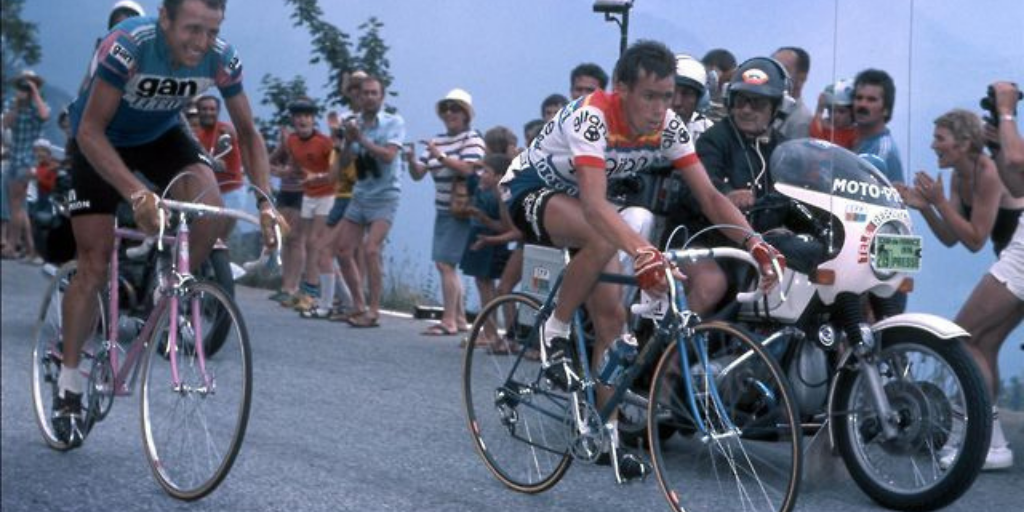The 63rd Tour de France was held between the 24th June and 18th July 1976. This was a 4017 km long edition divided into a prologue and 22 stages. The 5th and the 22nd stages had A and B parts, the 18th stage (on the Bastille Day) was split into three parts. The course included 8 mountain stages, five of them with a hilltop finish.
Due to the absence of Eddy Merckx (Molteni), there wasn’t any re-match between the big rivals of the previous edition. Bernard Thévénet (Peugeot-Esso), the defending champion, of course, was one of the biggest favourites of the race, but many of the experts considered Joop Zoetemelk (Gan-Mercier) an even bigger favourite. The names of Luis Ocana (Super-Ser) and Hennie Kuiper (TI–Raleigh) were also frequently mentioned in the previews. And of course, nobody forgot to mention Raymond Poulidor (Gan-Mercier) either, although he was 40 years old already.
Lucien Van Impe (Gitane-Campagnolo) was the winner of the mountain classification three times (1971,1972, 1975) previously, and the course of the race suited him well. But Van Impe didn’t want to compete for the yellow jersey. According to his directeur sportif, Cyrill Guimard, the Belgian climber was afraid to compete against Merckx because of the huge popularity of the Cannibal. But in 1976 there was no Merckx, just Van Impe in the peloton.
On the first week of the race was another Belgian rider, Freddy Maertens (Velda-Flandria) dominated. He claimed the yellow jersey on the prologue and kept it until Stage 9. Maertens won a total of 8 stages that year.
The 9th stage was up to Alpe d’Huez, it was only the second time the race visited the climb. Zoetemelk and Van Impe reached the top together. Zoetemelk won the stage, Van Impe took the yellow. Only a few of the favourites (f. e. Poulidor or Thévénet) could follow the leading duo from a modest distance, the others lost their chance to win the race.
The Tour de France in 1976 was also a tactical battle. After the first stage in the Pyrenees, Raymond Delisle (Peugeot-Esso) gained the leading position, only because the big favourites considered him not to be dangerous. Van Impe and Zoetemelk were focusing only on each other.
On the 14th stage, Van Impe took the yellow back. It was a troubled day, Guimard persuaded Van Impe quite hard to join a leading group including Ocana. Although the Spaniard was 10 minutes behind Van Impe in the GC, everybody remembered still very well his sensational victory with an almost six minutes gap on the top of Orcieres-Merlette in 1971.
The decisive moment of the race was definitely when Joop Zoetemelk reacted to late to Van Impe’s tactic that day. Although he delivered a stunning performance, he finished the stage 3 min 12 sec behind Van Impe.
And yet, at this point, Zoetemelk remained the only rider who was able to defeat van Impe.
Reaching the third week of the race, after the time trial on the 17th stage which was won by Van Impe, Zoetemelk had only one chance left: the 20th stage finishing on the Puy de Dôme. He won that stage, but could only gain 12 sec against Van Impe.
The Belgian rider won the Tour de France ahead of Joop Zoetemelk with an advantage of 4 min 14 sec. The race was all about the duel of these two riders, for sure. The third-placed Poulidor was more than 12 minutes behind the winner of the race.
TOP10 of the race
1. Lucien van Impe (Gitane-Campagnolo) 116 h 22 m 23 s
2. Joop Zoetemelk (Gan-Mercie r) 4:14
3. Raymond P oulidor (Gan-Mercier) 12:8
4. Raymond Delisle ( Peugeot-Esso) 12:17
5. Walter Riccomi (SCIC-Fiat) 12:39
6. Francisco Galdos (KAS) 14:50
7. Michel Pollentier (Velda-Flandria) 14:59
8. Freddy Maertens (Velda-Flandria) 16:6
9. Fausto Bertoglio (Jolliceramica) 16:36
10. Vicente López-Carril (KAS) 19:28
Do you like stories from the good old days of road cycling?
You might like these stories too:
